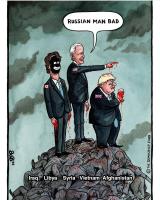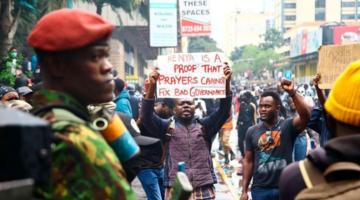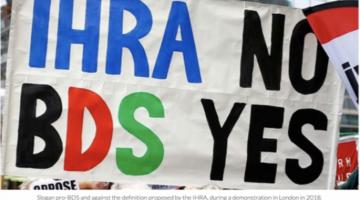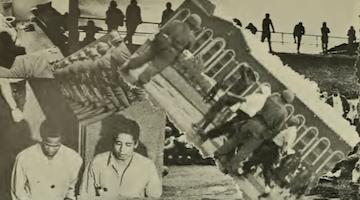“There can be no reversal of the corporate “race to the bottom” unless the Lords of Capital are dethroned.”
When former British Prime Minister Margaret Thatcher set her nation on the path of wholesale privatization and austerity in the 1980s, she declared that “resistance is futile.” “There is no alternative,” she decreed, to the rule of “markets,” not just in Great Britain, but for all of humanity and for all time. Thatcher found a soul mate in President Ronald Reagan, whose assault on the public sector in the U.S. -- packaged for a racist American electorate as a campaign to purge “welfare queens,” and accompanied by a fierce anti-drugs and crime crusade -- was soon joined by the most shamelessly corporatist wing of the Democratic Party. President Bill Clinton completed Reagan’s welfare and crime agenda and, as a final gift to Wall Street, deregulated the banks.
Thatcherism was firmly at the helm on both sides of the U.S. corporate duopoly. Democrat-based “resistance” was effectively confined to the “social issues” of abortion, gay rights and a vague quest for “diversity” -- questions whose resolution, either way, do not threaten the iron rule of capital. Barack Obama’s answer to the 2008 financial meltdown was to pump at least $4.5 trillion into private finance capitalist coffers and declare, through his attorney general, that the surviving banks were “too big to fail.” Although the system had come close to global collapse, an alternative remained unthinkable. Even the Occupy Wall Street movement of 2011-12 dared not propose the nationalization of the banking sector. As I wrote in these pages last month, the Occupiers “walked right up to the edge of the pool, but they did not dive in.”
“Barack Obama’s answer to the 2008 financial meltdown was to pump at least $4.5 trillion into private finance capitalist coffers and declare that the surviving banks were ‘too big to fail.’”
With the rule of the rich unchallenged, is it any wonder that an arch-racist Republican oligarch sits in the White House, while the richest oligarch of all, Jeff Bezos, muses over which American metropolis he will grant the privilege of becoming his next company town? Or that Trump’s Democratic opponent was Bill Clinton’s partner in corporate crime, who used her husband’s “foundation” to shake down the global oligarch class for tens of millions of dollars, and herself pocketed millions in speaking fees from bankers -- and who now contemplates a political comebackas the farcical queen of “resistance”?
There can be no reversal of the corporate “race to the bottom” unless the Lords of Capital are dethroned, through nationalization of their assets. Everything else is, ultimately, tinkering at the margins -- reforms that are worthwhile and necessary, but leave the “commanding heights” of political economy in the hands of the Lords of Capital.
The people would like to “break” the banks – indeed, many if not most would relish doing violence to the class that torments them to no end with fees and long ago ceased sharing even a small portion of their calculated usury with depositors. Everyone -- literally speaking -- knows that banker criminality was at the heart of the 2008 collapse, that the same institutions and thieves emerged from the debacle richer and more powerful than ever -- and everybody hates the banks. Black people despise entrenched capital most of all, and are most amenable to socialist solutions. But hatred of the banks cuts across all ethnic and most class lines. The only thing most Trump supporters hate nearly as much as their non-white fellows, is bankers. But, unless you are among the overwhelmingly white and rural residents of North Dakota, home to the only state public bank in the nation, you are not familiar with any public banking model and have never experienced a situation in which private bankers did not have the first and last word.
“The only thing most Trump supporters hate nearly as much as their non-white fellows, is bankers.”
Fortunately, as a serendipitous consequence of the newly legalized cannabis industry, California is awash in reefer cash that cannot be deposited in federally-sanctioned banks -- a problem begging for an immediate socialistic solution. As crusading anti-banker Ellen Brown reports in a recent article, the majority of cannabis “businesses are operating on the black market without paying taxes.” The state and cash-strapped municipalities want to tap these reefer-gotten gains, with Los Angeles “Mayor Eric Garcetti estimating it would bring in $30 million in taxes for the city.”
Sincere reformers, having watched as private banks leached billions in profits from bond-financed public development and affordable housing efforts -- often adding 50 percent or more to the cost of the project -- got the Los Angeles City Council to agree last month to put on the November ballot a bill that would establish a public bank for the city, the largest cannabis market in the state. City Council president Herb Wesson says the lure of marijuana money has been a boon to public banking advocates, but the cannabis windfall is not “what’s driving it.” Anti-bankers from across the state have formed a California Public Banking Alliance to push for state-chartered banks that could handle the financing of a whole range of governmental functions and projects, saving municipalities and agencies billions in private banking fees and usurious interest rates.
These public banks will require state charters and other legal adjustments to operate outside the federally-sanctioned system, but the political prospects look good. Ellen Brown reports that state treasurer John Chiang backs public bank charters, as does Democratic gubernatorial front-runner Gavin Newsom, the current Lt. Governor. President Trump has signaled that he might not stand in the way, leaving such matters to the states.
“The lure of marijuana money has been a boon to public banking advocates, but the cannabis windfall is not ‘what’s driving it.’”
On its Facebook page, the advocacy group Public Bank Los Angelessays getting out from under the Wall Street banks “can be a CORNERSTONE ISSUE for the progressive movement here at home and beyond.” They continue:
“Right now, our taxpayer dollars are being held by private banks like Wells Fargo, who use our money to invest in immigrant detention centers, destructive fossil fuel pipelines, private prisons and other socially and environmentally harmful projects.
“The best way to DIVEST from these horrible investments is to move our money out of Wall Street and into a public bank!
“Are you an environmentalist? Join the movement and find out how a public bank can help the City of Los Angeles invest in a clean, green renewable future where solar and wind power our cities, not dirty and destructive fossil fuels.
“Are you fighting against homelessness and for affordable housing? Public banking can dramatically lower the costs of affordable housing and take control back from the too-powerful developers and private banks.
“Do you fight for economic justice, including supporting the needs of the unbanked and underbanked? Organize with us and find out how public banking can be a powerful solution to provide banking services to those in need, keeping people away from payday lenders and other predatory institutions.
“Why do we allow private banks to syphon off our taxpayer dollars and extract wealth from our communities, when real alternatives exist? Why does the power to create money lie in the hands of obscenely rich and powerful bankers, who gamble with our money and our livelihoods? Why does Wall Street take a 50% cut of our infrastructure spending, when we have such severe and pressing needs?”
“Public banking can dramatically lower the costs of affordable housing and take control back from the too-powerful developers and private banks.”
Public Bank Los Angelesoffers an online FAQ that explores the issues in depth. “Private housing developers,” they write, “operate purely on a profit-motive and have no incentive to build affordable housing. A city-owned bank can extend the credit lines of community banks and credit unions to offer loans to low-income residents and help bankroll low-income housing, fund community land trusts, develop new short-term housing facilities, and rehousing programs to address solutions for the increasing homeless population.”
This is a project, not just to meet the material needs of the people, but to put a measure of democracy into the process. As the FAQ states, Los Angeles
“…currently banks with firms guilty of collusion, rigging, defrauding customers, predatory lending, money laundering, racketeering, graft and a host of other offenses that dramatically culminated in the fiasco of the financial crisis when ‘too big to fail’ oligarchy of banks took hundreds of billions of dollars in public sector money. Subsequently, not only were no perpetrators of the financial crimes punished, vast bonuses were paid out to bank executives. This is the opposite of 'efficiency.'”
Public banking on this scale will not overthrow the Lords of Capital, but it can provide the political model and vocabulary that will make the call for the nationalization of the private banks and their assets -- a revolutionary demand, by definition – both reasonable and palatable to a public that already hates the banks.
Americans live in a corporate-imposed political desert -- full of heat but starved of substance to guide popular left movements. Occupy Wall Street was the most dramatic response to the capitalist crisis of 2008, but the organizers were incapable of following the logic of their own rhetoric. Another meltdown, even more catastrophic, is brewing. This time, the people should be primed to act on their already existing, righteous hatred of the global financial class, the main enemies of all humankind.
BAR executive editor Glen Ford can be contacted at Glen.Ford@BlackAgendaReport.com.















